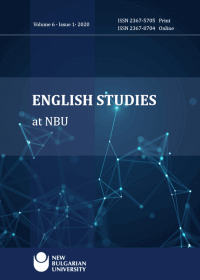English Mnemonic Lexicon: Constituent Structure and Verbalization Potential
English Mnemonic Lexicon: Constituent Structure and Verbalization Potential
Author(s): Irina Tivyaeva, Olga SyominaSubject(s): Social Sciences, Language and Literature Studies, Education, Foreign languages learning, Theoretical Linguistics, Applied Linguistics, Morphology, Semantics, Language acquisition, Comparative Linguistics, Psycholinguistics, Cognitive linguistics, Computational linguistics, Descriptive linguistics, Higher Education , Philology
Published by: Нов български университет
Keywords: Memory; mnemonic process; mnemonic lexicon; memory verbs; communicative context
Summary/Abstract: This paper presents a study of the system of lexical devices used by English speakers to verbalize theirpersonal memory experiences. The approach presented in the paper presupposes inclusion of nonnarrativestructures into the spectrum of language forms conveying mnemonic meanings and extends thelatter so as to encompass the meanings of encoding, storage, retrieval and loss. The research is based onthe hypothesis that lexical units expressing memory-related meanings in English constitute a specificallyorganized system. A variety of communicative contexts representing mnemonic situations are analyzed asto d evelop a t ypology o f m emory v erbalizers i n E nglish, estimate t heir f unctional p otential a nd role i nobjectifying personal memory experiences on the lexical level. The results confirm the original hypothesisand suggest that mnemonic lexicon as a linguistic reflection of the mnemonic faculty is an important andlargely understudied element of the language – memory system.
Journal: English Studies at NBU
- Issue Year: 6/2020
- Issue No: 1
- Page Range: 29-68
- Page Count: 40
- Language: English

